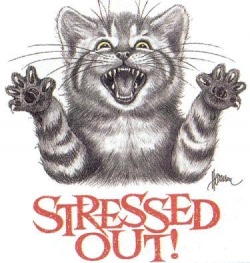Dark circles under your eyes, morning fatigue, chronic tiredness, the inability to handle stress, cravings for sweet or salty foods, increased allergy symptoms, mild depression ...
Do any of these symptoms sound familiar to you? If so then you may be suffering from adrenal fatigue, which doctors estimate affects 80% of the U.S. population. I hadn't a clue about adrenal exhaustion or fatigue until I realized that I suffered from many of these symptoms, including dark circles under my eyes that would not go away, regardless of how much sleep I got. That's when I got interested in adrenal fatigue tests and further educating myself about this condition.
What is Adrenal Fatigue?
Adrenal fatigue is a strangely paradoxical health problem. The adrenal glands, which are tiny pea-sized glands that rest atop the kidneys, do a mighty job in the body. They control and regulate more than 50 hormones in the body, and are primarily responsible for our "stress response." When we are under stress, the adrenal glands release hormones like cortisol to help us deal with the stress. As you may know, cortisol controls the strength of the immune system, normalizes blood sugar, and regulates blood pressure, among other things. Too much cortisol can trigger autoimmune responses in the body, as well as cause weight gain. Cortisol is also related to our body's primitive "fight or flight" response.
So we rely on our adrenal glands to help us deal with and handle stress, which is a good thing. The bad news is that when we are subject to prolonged stress, the adrenal glands are the first to fail. The adrenal glands can function at high capacity for only so long before they break down. In fact, what most people call a "nervous breakdown" is really adrenal fatigue.
Since about 80% of the current population has adrenal exhaustion or fatigue, it's clear that most of us are subject to prolonged stress. These stressors come from too little sleep, too much caffeine, multi-tasking, poor nutrition, and too much work. Sound familiar?
Adrenal Fatigue Tests - Three Self Tests
So how do you know if you are among the 80% who have adrenal fatigue? Well, examining your lifestyle is one easy way to tell. Plus, if you seem to be unable to catch up on your sleep or are chronically tired and grumpy, you're likely to have this problem. But there are three adrenal fatigue tests you can administer to see if your adrenal glands are screaming for help.
1. Ragland's Test
You'll need a home blood pressure machine for this test (you can buy one for around $10 at any drug store). First, take your blood pressure while sitting down. Then, stand up and take your blood pressure again, right away. Your systolic number (the first or top number) should have increased by 8 or 10 points. If the number dropped, then you probably have adrenal fatigue.
2. Pupil Dilation
For this test you need a flashlight and a mirror. Look into the mirror and shine the flashlight into the pupil of one eye. Your pupil should contract pretty quickly. If your pupil does not contract after 30 seconds, or even dilates, then your adrenals need some help.
3. Pain and Sensitivity
Your adrenal glands sit right on top of your kidneys. If you palpate that area and feel pain, then your adrenal glands are fatigued. You can also try pressing on the reflexology point for the adrenal glands, which is located at the top inside edge of your foot arch. If that area is sensitive, then so are your adrenal glands.
Adrenal Fatigue Treatment
My physician recommended several approaches to dealing with this situation, and I've found three of them help me the most:
1. Herbal Support
I'm taking an herbal formula called X51 (or Eleviv) from XanGo that works well. It contains four main ingredients that offer adrenal support: citrus sinensis, eurycoma longifolia suntheanine, and camellia sinensis. Other people use straight herbal tinctures.
2. Order My Life
By focusing on a routine and sticking to it, I reduce the level of over stimulation in my life. I try to check email and voice mail less often, and have more "quiet time" to myself.
3. Rest at 10, 2 and 4
Apparently the adrenal glands tend to become most fatigued at these times, so I stop for short 15-minute power naps at these times. Lying down is recommended, if at all possible, so I do for my power naps.
It can take time to help your adrenals recover -- anywhere from 6 to 24 months, depending on how stressed they are. The good news is that recovery can be taken in baby steps, not radical changes. I like that, don't you?
Stephanie Yeh is a zen cowgirl obsessed about horses, healing, natural remedies, herbs, magic, MLM, and more. Check out natural horse care tips, ways to fund your horse obsession, natural health products, and more on her blog (http://zencowgirl.blogspot.com) and order XanGo mangosteen products (including Eleviv/X51)on her website (http://www.mangosteengood.com).
Article Source: http://EzineArticles.com/?expert=Stephanie_H._Yeh

 RSS Feed
RSS Feed